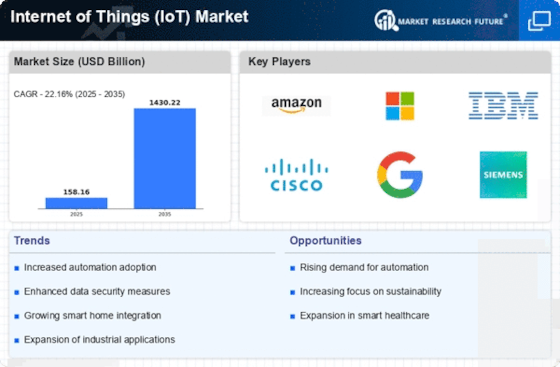Top Industry Leaders in the Internet of Things Market

Competitive Landscape of the Internet of Things (IoT) Market
The Internet of Things (IoT) market is experiencing rapid growth, fueled by advancements in technology, increasing connectivity, and surging demand for connected devices across various industries. This dynamic environment attracts a diverse range of players, making the competitive landscape complex and constantly evolving.
Key Players:
- Amazon Web Services (US)
- AT & T Inc (US)
- Cisco System (US)
- Google Inc. (US)
- Oracle Corporation (US)
- Dell Inc. (US)
- Microsoft Corporation (US
Strategies Adopted:
To compete effectively, companies are adopting various strategies:
- Platform-based approach: Offering comprehensive IoT platforms that integrate various components like hardware, software, connectivity, and security. This strategy allows companies to provide end-to-end solutions and cater to a broader range of customer needs.
- Verticalization: Focusing on specific industry verticals and tailoring solutions to meet their unique requirements. This strategy enables companies to gain deep domain knowledge and develop competitive advantages in specific markets.
- Partnerships and collaborations: Collaborating with other players in the ecosystem, including technology companies, device manufacturers, and system integrators, to expand their reach and offer integrated solutions.
- Mergers and acquisitions: Engaging in M&A activities to acquire specialized technologies, expand their portfolio, and gain access to new markets or customer segments.
Factors for Market Share Analysis:
Several factors influence market share in the dynamic IoT landscape:
- Product portfolio breadth and depth: Offering a wide range of products and solutions catering to various needs and industries.
- Technology leadership: Continuously innovating and investing in cutting-edge technologies like AI, cloud computing, and blockchain to offer advanced solutions.
- Brand recognition and reputation: Building trust and credibility with customers through strong brand image and positive customer experience.
- Global reach and presence: Operating in diverse geographical regions and establishing strong local partnerships.
- Pricing and business models: Offering competitive pricing and flexible business models, including subscription-based services and pay-as-you-go options.
New and Emerging Companies:
The influx of new entrants continues to reshape the competitive landscape:
- Startups: Numerous startups are focusing on specific niche areas like smart home solutions, wearables, and industrial IoT applications. They bring innovative ideas and agility to the market, challenging established players.
- Specialized companies: Several companies are specializing in specific technologies like sensor development, connectivity solutions, or data analytics, providing niche expertise and competing with broader platform providers.
- Tech giants: Companies like Apple, Google, and Amazon are leveraging their existing user base and technology strengths to enter the IoT market with their own platforms and devices.
Current Company Investment Trends:
Companies across the IoT ecosystem are making significant investments in various areas:
- Advanced technologies: AI, machine learning, and blockchain are being integrated into IoT platforms to enable intelligent data analysis, edge computing, and secure data exchange.
- Security solutions: Cybersecurity is a critical concern for IoT deployments, leading to increased investment in security protocols, threat detection, and vulnerability management.
- Connectivity infrastructure: Expanding and enhancing network infrastructure is crucial for ensuring smooth and reliable data transmission from connected devices.
- Partnerships and collaborations: Companies are actively seeking partnerships with complementary players to broaden their offerings and reach new markets.
- Verticalization: Investments are directed towards developing industry-specific solutions and expertise to cater to the unique requirements of different sectors.
Latest Company Updates:
October 2023-
FloLive, Kigen has partnered with Protahub for offering local internet of things cellular connectivity in Turkey. Through this partnership customers will reap the perks from a sole SKU which simplifies their supply chain and logistics and provides a unified and streamlined global experience. Both the companies are working hand in hand on an array of projects and initiatives and are looking in replicating this victory in other areas so that the deployments worldwide are achievable through one SKU & a unified experience. Through an eSIM, one will possess a strong foundation for the trusted devices in multiple geographies and complying with local regulations.
A global enabler of intelligent edge, Telit Cinterion revealed that it is now working with WaterSignal for ensuring always-on connectivity to their real-time water monitoring & leak detection systems. Considering the worsening and ongoing power outage, WaterSignal required transferring water data independent of the power source. It was also in need for a dependable and trusted partner for network services and cellular IoT connectivity. Owing to these needs, WaterSignal had turned to the cellular LPWA modules of Telit Cinterion and IoT connectivity solution for their units.
FCC has lately proposed a novel voluntary cybersecurity labelling program that is intended in offering customers easily understandable information concerning the security of their IoT devices. A wide variety of connected devices will be eligible in receiving the label that will also comprise a scannable information & newly made IoT registry of qualifying devices.

